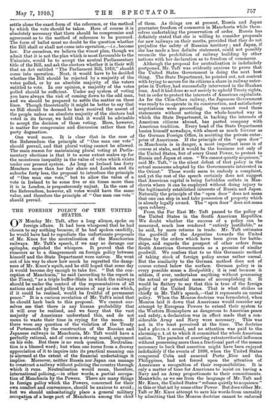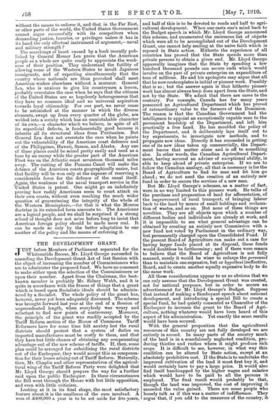THE FOREIGN POLICY OF THE UNITED STATES.
ON Monday Mr. Taft, after a long silence, spoke on foreign affairs. It had been whispered that he had chosen to say nothing because, if he had spoken candidly, he would have had to repudiate the unfortunate proposals of Mr. Knox for the neutralisation of the Manchurian railways. Mr. Taft's speech, if we may so derange our epitaphs, exploded the whispers. It proved that the rumours as to a disagreement on foreign policy between himself and the State Department were untrue. He went out of his way to show how much he regretted the damp- ness of Mr. Knox's squib, and he still hoped that some day it would become dry enough to take fire. " But the con- ception of Manchuria," he said (according to the report in the Times), " as a triple buffer-State in which the railways should be under the control of the representatives of all nations and not policed by the armies of any is one which, if it could. be realised, would be fruitful of permanent peace." It is a curious revelation of Mr. Taft's mind that he should hark back to this proposal. We cannot our- selves see that there is any human probability that it will ever be realised, and we fancy that the vast majority of Americans understand this, and do not mean to waste their time in crying for the moon. If there were any question of the violation of the Treaty of Portsmouth by the constriction of the Russian and Japanese railways in Manchuria, Mr. Taft would have a perfectly rational, and of course a strong moral, argument on his side. But there is no such question. Neutralisa- tion is a blessed word; but when one turns from a drowsy appreciation of it to inquire into its practical meaning one is alarmed at the extent of the financial undertakings it implies. Moreover, neither Russia nor Japan can manage to construct a railway without policing the country through which it runs. Neutralisation would mean, therefore, international policing,—in other words, a partial occupa- tion of Manchuria by the. Powers. There are many things in foreign policy which the Powers, concerned for their own comfort and convenience, should be anxious to avoid; but we should unhesitatingly place a general military occupation of a large part of Manchuria among the chief of them. As things are at present, Russia and Japan guarantee freedom of commerce in Manchuria while them- selves undertaking the preservation of order. Russia has definitely stated that she is willing to consider proposals for new railways on their merits, provided that they do not prejudice the safety of Russian territory ; and Japan, if she has made a less definite statement, could not possibly reconcile the prohibition of railway building by other nations with her declaration as to freedom of commerce.
Although the proposal for neutralisation is indefinitely postponed, Mr. Taft was evidently anxious to prove that the United States Government is doing the next best thing. The State Department, he pointed out, not content with trying to secure for its citizens a share in railway enter- prise in Turkey, had successfully intervened in the Hankau loan. And it had done so not merely to uphold Treaty rights, but in order to protect the interests of American capitalists. As for the Chin-Chau railway, the Japanese Government was ready to co-operate in its construction, and satisfactory negotiations were proceeding. One cannot read these statements without noticing the whole-hearted. way in which the State Department, in backing the interests of American citizens abroad, has parted company with American tradition. Every head of the State Department busies himself nowadays, with almost as much fervour as the German Foreign Office, in assisting the private enter- prise of Americans. If the principle of the " open door " in Manchuria is in danger, a most important issue is of course at stake, and it would be the business not only of the United States, but of every Great Power, to protest to Russia and Japan at onoe. " We cannot quietly acquiesce," said Mr. Taft, " in the silent defeat of that policy in the actual measures adopted by the Governments interested in the Orient." These words seem to embody a complaint, and yet the rest of the speech certainly does not suggest that American capital is being forbidden outlets in Man- churia where it can be employed without doing injury to the legitimately established interests of Russia and Japan. Naturally the principle of the " open door " does not mean that one can step in and take possession of property which is already legally owned. The " open door' does not mean open robbery. From the Far East Mr. Taft passed to the policy of the United States in the South American Republics. We doubt whether the success of a policy can be measured, much less rendered " entirely justifiable," as he said, by mere returns in trade. Mr. Taft estimates the goodwill of the Argentine towards the United States by the orders which have been given for battle- ships, and regards the prospect of other orders from South American Governments as a promise of similar goodwill. We confess that to us this Germanic method of taking stock of foreign policy seems rather unreal. But the similarity to the German method does not of course extend below the surface. German policy is in every possible sense a Realpolitik ; it is real because it seldom, if ever, undertakes anything without possessing the actual or potential means of accomplishing it. It would be flattery to say that this is true of the foreign policy of the United States. That is what strikes us chiefly in Mr. Taft's speech,—that it represents an unreal policy. When the Monroe doctrine was formulated, when Monroe laid it down that Americans would consider any attempt by European Powers to extend their system to the Western Hemisphere as dangerous to American peace and safety, a declaration was in effect made that a con- siderable Army and Navy were necessary. This was not in the least perceived at the time. The doctrine had a please at sound, and no attention was paid to the alarming e t nt to which it committed the whole American nation. The paradox of asserting extraterritorial influence without possessing more than a fractional part of the means necessary to back that assertion might have been enjoyed indefinitely if the events of 1898, when the United States conquered Cuba and annexed Porto Rico and the Philippines, had not forced upon the attention of Americans a recognition of their responsibilities. It is only a matter of time for Americans to insist on having a Navy and an Army proportionate to their commitments. Meanwhile, as we see from the language of Mr. Taft and Mr. Knox, the United States " refuses quietly to acquiesce " in this or that act by some other Power. But does either Mr. Taft or Mr. Knox attempt to save his words from unreality by admitting that the Monroe doctrine cannot be enforced without the means to enforce it, and that in the Far East, or other parts of the world, the United States Government cannot argue successfully with its competitors when demanding justice, luxuries, or privileges unless it has in its hand the only effectual instrument of argument,—naval and military strength ? The searchings of heart caused by a book recently pub- lished by General Homer Lea prove that the American people as a whole are quite ready to appreciate the weak- ness of their position. They understand the futility of allowing some of the Western States to insult Japanese immigrants, and of expecting simultaneously that the country whose nationals are thus provoked shall meet American wishes elsewhere without a murmur. General 'Lea, who is anxious to give his countrymen a lesson, probably overstates the case when he says that the citizens of the United States are so hopelessly heterogeneous that they have no common ideal and no universal aspiration towards loyal citizenship. For our part, we never cease to be astonished at the manner in which the diverse elements, swept up from every quarter of the globe, are welded into a society which has an unmistakable character of its own,—a character which we believe, in spite of all its superficial defects, is fundamentally good because it inherits all its structural ideas from Puritanism. But General Lea does not overstate the case when he points out the vulnerability of the American coast defences and of the Philippines, Hawaii, Samoa, and Alaska. Any one of these places could be seized pretty easily and used as a base by an enemy while the greater part of the American Fleet was on the Atlantic coast seventeen thousand miles away. The cutting of the Panama Canal will make the defence of the American coasts geographically easier, but that facility will be won only at the expense of reserving a considerable force for the defence of the canni itself. „Again, the weakness of the naval transport service in the 'United States is patent. One might go on indefinitely proving how rashly Americans seem to court attack on their own coasts, without even reaching the much wider question of guaranteeing the integrity of the whole of the Western Hemisphere,—for that is what the Monroe doctrine in its extended form amounts to. The Americans are a logical people, and we shall be surprised if a strong school of thought does not arise before long to insist that American foreign policy should be made more real. It can be made so only by the better adaptation to one another of the policy and the means of enforcing it.











































 Previous page
Previous page